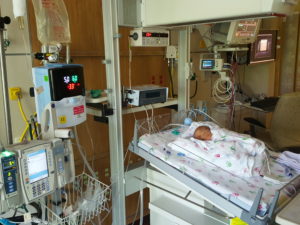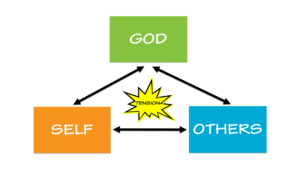I am not a big TV watcher, but so many people recommended the series This is Us to me, that I felt like I had to watch it just to be relevant. I am unavailable when it is playing live, so me and my wife catch up on the NBC app.
I recently watched the Season 2 Episode, Most Disappointed Man. There is a scene in that episode where the young William is going to be sentenced by the judge for his drug crime. William explains to the judge how disappointed he is with the tragedy in his life, and the role his difficult and under-resourced environment played in his crimes.
William’s explanation seems to rattle the judge, who asks for a private meeting with William. In that meeting, the judge explains how he is disappointed as well, and that he doesn’t like the fact that he has to sentence people to long prison sentences. The judge recalls a few, recent sentences he had to hand down recently, and he says, I know how the story ends for the guys he sentences.
The judge then  tells William he intends to commute his sentences, if he promises to always think of the judges face every time he is about to do something that could lead to going back to jail. On the surface, that all seems really sweet. But, as I reflected on it, that scene really bothered me for several reasons.
tells William he intends to commute his sentences, if he promises to always think of the judges face every time he is about to do something that could lead to going back to jail. On the surface, that all seems really sweet. But, as I reflected on it, that scene really bothered me for several reasons.
I have been blessed to be involved in teaching life skills in one of our state prisons here in Illinois, and also involved in some mentoring of returning citizens. I have done a great deal of research on incarceration, attended conferences, read books, listened to real-life stories and testimonies, etc. With that as a backdrop, here are the things that bothered me about that scene:
First, it sets up this dichotomy between the judge and the perpetrator. Like the judge has reached some kind of perfected state where he doesn’t have to worry about doing bad things, whereas the perpetrator will always have to worry about returning to a life of crime.
One thing I have learned in my prison outreach work is that being bad or good has precious little to do with why some people are in prison and other people like me are not. My neighborhood, financial opportunities, educational opportunities, my race, my luck, my relationships and my fear are the primary things that prevented me from ending up on drugs and/or in jail for a crime of any kind. I could have easily ended up in jail for a variety of reasons but these external factors conspired to rescue me.
On the other hand, many, many incarcerated people end up incarcerated because their external circumstances conspire together to lead them to jail. My external situations provided me the privilege I needed navigate my life successfully away from prison up until this point. Their external situations worked against them developing unhealthy habits, attitudes, behaviors and relationships that ultimately led them to prison.
Second, the phrase, I know how that story ends… with regard to the people the judge sentences, is offensive in many ways. He has no idea how anyone’s story is going to end after he sentences them. NO ONE is beyond full and complete redemption, and a meaningful life well lived. I have seen and heard of many, many formerly incarcerated people completely transforming their lives in and out of prison, and becoming productive, healthy members of society and healthy spouses, parents, neighbors, coworkers and friends.
Assuming that someone is incapable of transformation and projecting that onto their lives can have a worse effect than a physical prison sentence. Saying someone is beyond hope of redemption is a virtual life sentence that strips people of their dignity and God-given potential to unleash the masterpiece that God intended for their lives.
Also, assuming we know how are own story ends is also presumptuous. Judges commit crimes, have affairs, become addicts, abuse their spouses and kids, and end up in jail. No one is above their own human nature. Every one of us needs to consistently invest in healthy growth and development throughout our lives. We are really much closer to failure than we like to think we are.
I would rather tell every prisoner or ex-prisoner they can do it. They can turn their lives around. They can redeem the junk in their lives and trade it in for joy, meaning, love, peace and wholeness. Even if almost all of them do fail and never get their lives back on track, it is worth projecting hope and positivity to help the one person get over the hump and make it.
We do not know how anyone’s story ends. This fact drives me to make sure I keep investing in my own story to make sure it stays as healthy as it can be. This fact also drives me to project hope and transformation onto everyone I meet – especially the easily discarded and disdained people in our society. I will not and cannot know exactly how each their stories will end, but I can say with certainty they are capable of living out a meaningful, hopeful, loving, fully redeemed story. I want to be about that in my own life and in the lives of others.
















